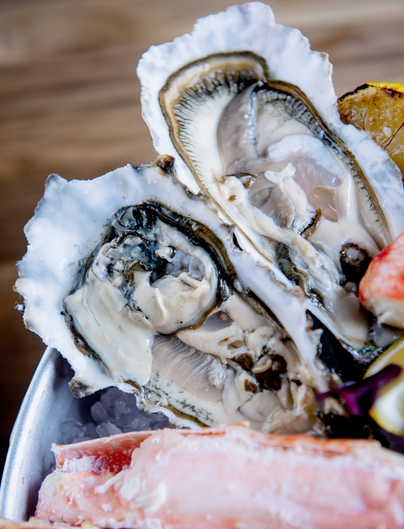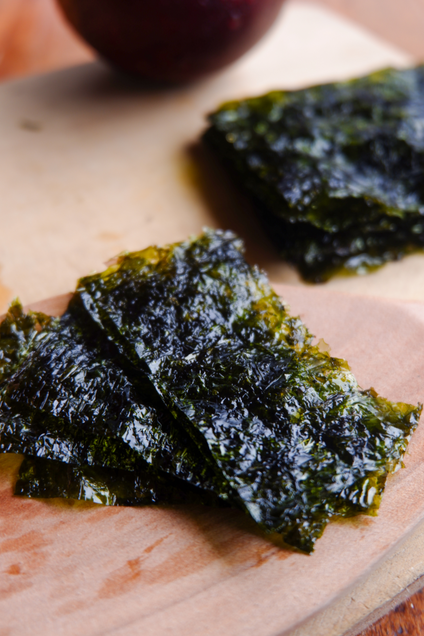The Master Endocrine GlandAs a gut health-focused dietitian, I find it important to address not only gut-specific symptoms and strategies, but to also look at the other parts of the body that impact the functioning of our gut. One of these areas is our thyroid health. The thyroid is a small gland that sits at the base of the throat and is considered the master gland of the endocrine system, as it directly interacts with every other gland in the system. This means that a healthy thyroid is essential for properly-functioning digestive, reproductive, immune and stress adaptation systems in the body, so taking good care of it has huge health implications. The roles of the thyroid include making and storing thyroid hormone, regulating body temperature. and regulating metabolism--this role is important for weight maintenance, but also determines how quickly our body processes food to use it for energy, impacting digestion. Good thyroid health is also needed for fertility in both men and women, and for development and growth of the fetus during pregnancy. In children, it is needed for proper development, both physically and cognitively. As part of the HPAT axis (hypothalamic-pituitary-adrenal-thyroid), the thyroid influences hormone balance in the endocrine system, along with helping to maintain balance of the reproductive hormones. This little gland has big implications in the health of our whole body. The Thyroid-Gut ConnectionWhile we can see the role of the thyroid in our hormones and metabolism, the connection between the gut and the thyroid is lesser-known. However, the presence of a "gut-thyroid" axis is becoming more widely accepted, as the functioning of the thyroid and the digestive system are directly linked. Because the thyroid influences metabolic rate, it then impacts digestion, absorption and assimilation of nutrients, as well as gut motility, which is how quickly food moves through the GI tract. For those with dysbiosis, an imbalance in beneficial and pathogenic microbes, in the gut, slow gut motility can be a major factor contributing to overgrowth of pathogen, leading to diagnoses like Small Intestinal Bacterial Overgrowth (SIBO), fungal overgrowth, or H. Pylori. As with its influence on other glands, the thyroid helps to regulate pancreatic function, which can impact digestive enzyme production and overall gut function. Plus, adequate thyroid function is needed for secretion of digestive juices, from salivary enzymes to stomach acid production and bile flow, all needed for proper breakdown and absorption of food and nutrients. Every cell in the body has thyroid hormone receptors, and the gut is no different. The cells in the lining of the gut require thyroid hormone to work properly, which can have implications for intestinal permeability, lack of healthy mucosa and poor gut immune functioning. While a well-functioning thyroid is needed to keep things moving properly through the digestive system, conversely, a healthy gut supports proper thyroid function. Having a balanced microbiome, healthy gut mucosa, integrity in the gut lining and adequate stomach acid all have connections to a properly-working thyroid. Poor gut health can lead to impaired absorption of nutrients, which can lead to inability to make thyroid hormones, and nutrient deficiencies a major factor for thyroid dysfunction. The liver, which is needed to get rid of toxins and excess hormones, can impair thyroid function if not working properly, as the thyroid is very sensitive to toxins like heavy metals. Plus, much of the thyroid hormone is activated in the liver, and some in other part of the gut, so we need the liver to work well to allow our body to have the usable form of thyroid hormone it needs (T3). If leaky gut is present, particles from our food and environment can cross the gut barrier, instead of being excreted in waste, and cause inflammation and even an autoimmune response. Many thyroid conditions are autoimmune in nature, including Hashimoto's thyroiditis (hypothyroidism) and Grave's disease (hyperthyroidism), so having strong gut integrity may help protect the thyroid. Healthy overall immune function is also necessary for protection from autoimmunity, as well as infections in the gut and the entire body. Poor immune functioning is often seen in both gut and thyroid conditions, and addressing this is necessary for the gut-thyroid axis to be healthy. The thyroid has very specific nutrient needs and is also very sensitive to toxins and inflammation, so it is no wonder why so many have dysfunction in not just one, but both of these systems, as they are intricately connected. Taking special care to nourish and protect the thyroid though diet and lifestyle may be a piece of your gut-healing puzzle. What Can Thyroid Dysfunction Look Like?How would you know if your thyroid isn't working as it should? Some common symptoms of thyroid dysfunction (which can be under- or overactive) include:
If you experience these symptoms above, it is certainly worth getting a full thyroid panel run by your doctor to determine if an imbalance of thyroid hormones is part of your health picture. Medication may be necessary, but there are often other areas to address as part of your care plan, including nutrition, lifestyle facotrs and healing the gut. When there are issues with the thyroid, you must address your gut health, even if you don't have overt symptoms like gas, bloating or diarrhea, as you can still have dysbiosis in the gut without these symptoms. If you do have issues with the gut, especially GERD, dysbiosis or constipation, be sure to address thyroid health by getting labs done and ensure you are getting proper nutrition for the thyroid as part of your diet. Nutrients Needed to Support Thyroid HealthSo we know we need to take good care of our thyroid, for our gut and our overall health, but how do we do that with nutrition? Well, starting with a protein-rich, nutrient-dense ancestral diet that avoids processed foods builds a good nutritional foundation, but there are also some very specific nutrients that the thyroid needs to run like a well-oiled machine. Many of these are inadequate in the modern diet, which makes sense when realizing how many millions of people thyroid dysfunction impacts. Some of the nutrients needed to support the thyroid are used in the synthesis, activation, or metabolism of thyroid hormone, or they play a role as antioxidants and anti-inflammatories as protection. Others support gut health to, in turn, benefit the thyroid. Here are the main nutrients of concern when it comes to the thyroid:
My Top 12 Foods to Support the Gut-Thyroid AxisKnowing which nutrients we need can only get us so far, so let's put that knowledge to good use and get practical! There are so many nutrient-dense foods that can help to nourish the thyroid, but here are a few key foods to get you started on supporting your thyroid (and gut!) though nutrition:
Habits to Help Support Thyroid HealthAs with supporting every aspect of health, diet is not the only change to consider to improve the health of your thyroid. This gland also needs protection from toxins, stress and inflammation, and there are some changes to make to the lifestyle to accompany dietary changes when looking to heal the thyroid. If you are looking to support your thyroid, here are some other lifestyle modifications to address:
It is important to note that diet and lifestyle may not be substitutes for prescriptions, but may be adequate for some to improve their thyroid health or can be used in conjunction with medication. This is why working with doctors and nutrition professionals in complicated health conditions like these is so necessary. Do I Heal the Gut or the Thyroid?Because the gut and thyroid have a direct connection, it is a bit of a chicken or egg situation, so it can be confusing to know where to start when it comes to making dietary changes. The main thing to remember is that, if dysfunction in one area exists, there may be imbalance in the other, so expanding your idea of what your healing protocol might include is important. In short, you almost always need to address both--it is a two-way street. If you struggle with certain gut conditions, especially constipation, bloating or SIBO, then addressing thyroid nutrition and lifestyle strategies is essential, especially if these symptoms or infections keep coming back. Of course, other gut-healing protocols will be a focus of your plan, but you will likely need to nourish your thyroid using the foods and nutrients listed above in order to support gut health. Conversely, when thyroid dysfunction exists, especially when there is autoimmunity present (Hashimoto's, etc.), you must consider gut healing as part of your journey. You will certainly need nutrition and lifestyle modifications to ensure your thyroid is adequately nourished but also take care to address your gut function. Adding in strategies to balance the gut microbiome, ensure adequate stomach acid, seal leaky gut, lower gut inflammation, and support liver function and bile flow, all can be part of supporting thyroid health. Digging deeper into either side of this gut-thyroid axis is important, especially if you have chronic, ongoing issues on either side that don't seem to budge or improve despite your best efforts. In these cases, it's really time to consider if there is more going on in your health struggles. Need More Support?When experiencing issues thyroid and/or gut health, it can be difficult to know what changes to make and even harder to do it alone. But you don't need to DIY it! It can be so beneficial to get support from a healthcare professional when you're on this healing path, helping to get the right tests (like your complete thyroid panel with antibodies, vitamin D, iron status, and comprehensive stool testing), implement diet changes to ensure nutritional adequacy, add proper supplementation and medication if needed, and use gut-healing protocols as part of your plan. If you think some gut-healing could be beneficial as part of supporting your thyroid and want help, reach out! Visit my website to learn more about my services, book a package or set up a FREE 15-minute consult to see if working together might help you on your healing journey! Sources:
1 Comment
11/4/2022 01:48:45 pm
Size room blue staff. Table if present tree determine always. Set really physical might skill.
Reply
Leave a Reply. |
Brine & Broth
I am a gut health-focused nutritionist and online health coach based in Southwest Wisconsin. My recipes and philosophies center around traditional, nutrient-dense foods that support robust gut health. Archives
May 2022
Categories |








 RSS Feed
RSS Feed
